
# 266
May 30, 2006
In this issue:
UNITED NATIONS DEVELOPMENT PROGRAMME (UNDP)
- UNDP, World Bank and government pledge to battle HIV/AIDS
- UNDP survey shows southerners at risk from landslides and floods
- EU-UNDP Central Asia Drug Action Programme: Study Tour to Italy
- EU-UNDP Border Management in Central Asia Programme: Training for High Ranking Managers
UNITED NATIONS HIGH COMMISSIONER FOR REFUGEES (UNHCR)
- Amendments to the Kyrgyz Law on Refugees
- The Centre for Refugee Women Dusty is Operational
UNITED NATIONS DEVELOPMENT PROGRAMME (UNDP)
UNDP, World Bank and government pledge to battle HIV/AIDS
BISHKEK, 30 May 2006 (IRIN) - The World Bank’s regional project to control HIV/AIDS in Central Asia and the United Nations Development Programme (UNDP) in Kyrgyzstan on Tuesday signed an agreement to fight the epidemic in the Central Asian country.
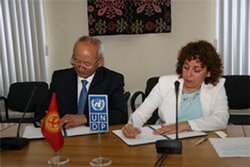 “We need to strengthen national coordination mechanisms on fighting AIDS and this agreement will help us to do so,” Tilek Meimanaliev, head of the World Bank’s Central Asia Regional AIDS Control Project, said in the Kyrgyz capital, Bishkek. “We need to strengthen national coordination mechanisms on fighting AIDS and this agreement will help us to do so,” Tilek Meimanaliev, head of the World Bank’s Central Asia Regional AIDS Control Project, said in the Kyrgyz capital, Bishkek.
The World Bank official said that thanks to the agreement, AIDS centres in the region would be provided with necessary medical equipment, as well as assistance with regard to epidemiological surveillance and training of paramedics.
“HIV/AIDS does not have borders and therefore there needs to be an inter-regional approach to this menacing disease,” Sezin Sinanoglu, acting head of UNDP’s mission, said.
UNDP has been working in Kyrgyzstan on HIV/AIDS prevention amongst vulnerable groups and assisting in the development of national strategies since 1997.
There are 916 registered cases of HIV/AIDS in the country, according to the Kyrgyz AIDS centre, with the majority of them in the south. The main mode of transmission - some 80 percent of all registered cases - is through injecting drug use, the centre said, adding that almost 50 people had died since 1996 because of AIDS. However, experts claim the real figure is 10 times that number.
“A lack of monitoring and assessment systems, as well as stigma attached to [HIV] patients are major problems which means we cannot know the exact number of HIV-infected people,” Meimanaliev added.
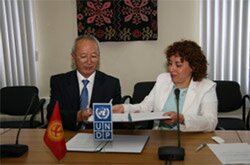 Their comments coincided with the launch of a new global report on HIV/AIDS by the Joint United Nations Programme on HIV/AIDS (UNAIDS). The report said the epidemic was on the rise in many post Soviet states - including four Central Asian republics: Kazakhstan, Kyrgyzstan, Tajikistan and Uzbekistan - fuelled mainly by injecting drug usage. Central Asia lies on the front line of drug trafficking from Afghanistan, the world's top opium producer. Their comments coincided with the launch of a new global report on HIV/AIDS by the Joint United Nations Programme on HIV/AIDS (UNAIDS). The report said the epidemic was on the rise in many post Soviet states - including four Central Asian republics: Kazakhstan, Kyrgyzstan, Tajikistan and Uzbekistan - fuelled mainly by injecting drug usage. Central Asia lies on the front line of drug trafficking from Afghanistan, the world's top opium producer.
In Kazakhstan, an estimated 12,000 people were living with HIV by the end of 2005. Overall prevalence was 0.1 percent, but it jumped to 56 percent among drug users in one recent study, according to UNAIDS.
An estimated 31,000 people (0.2 percent of the general population) were infected with HIV in Uzbekistan, Central Asia's most populous state with over 25 million. In Kyrgyzstan the figure was 4,000 (0.1 percent) and in Tajikistan it stood at 4,900 (0.1 percent). UNAIDS does not have figures for Turkmenistan, the region's most reclusive state.
For more information, please contact Ms. Vasilina Brazhko, Communication Officer of UNDP in Kyrgyzstan by phone: 61-12-13 or by e-mail:
UNDP survey shows southerners at risk from landslides and floods
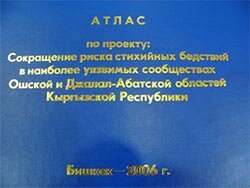 BISHKEK, 15 May 2006 (IRIN) - A United Nations Development Programme (UNDP) survey on natural disasters in southern Kyrgyzstan shows many communities are at risk from landslides and floods. The survey, launched on Friday in the capital, Bishkek, forms part of ongoing efforts to reduce the risk of natural hazards in the country. BISHKEK, 15 May 2006 (IRIN) - A United Nations Development Programme (UNDP) survey on natural disasters in southern Kyrgyzstan shows many communities are at risk from landslides and floods. The survey, launched on Friday in the capital, Bishkek, forms part of ongoing efforts to reduce the risk of natural hazards in the country.
The survey was conducted in the most vulnerable communities of the southern provinces of Osh and Jalal-Abad - the areas most disaster-prone in the Central Asian state.
“The main priorities of the project are providing assistance to local authorities on early warning and prevention of natural disasters, as well as raising awareness of the population to the possible consequences,” Arturo Hein-Caceras, UNDP officer-in-charge, said in the capital, Bishkek.
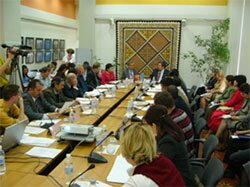 Based on the results of the survey, a special atlas was launched, containing computerised cartographic examples of disaster risk assessments for reducing the impact of natural hazards. According to the survey, the main problems in Osh province are landslides, while in Jalal-Abad the largest risk is floods. Based on the results of the survey, a special atlas was launched, containing computerised cartographic examples of disaster risk assessments for reducing the impact of natural hazards. According to the survey, the main problems in Osh province are landslides, while in Jalal-Abad the largest risk is floods.
More than 500 natural disaster-related incidents, including earthquakes, landslides and avalanches, were registered in Osh and Jalal-Abad over the past few years. About 150 people were killed by the disasters in 2004 and 2005 in the two provinces, while the death toll in the first four months of 2006 was 23.
Emergencies Minister Janysh Rustenbekov said that around 3.5 million – or roughly 70 percent of the former Soviet republic’s population – were living in disaster-prone areas, with 1.5 million of them residing in high-risk areas. “Around 100 settlements and 70 villages in high-risk areas need to be relocated as soon as possible. But we lack additional resources and cannot help these communities,” the minister conceded.
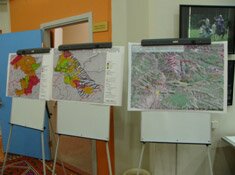 In an effort to mitigate the risks, the most vulnerable communities were identified and in six village councils and 20 villages of Osh and Jalal-Abad provinces, voluntary rescue teams are being established. In an effort to mitigate the risks, the most vulnerable communities were identified and in six village councils and 20 villages of Osh and Jalal-Abad provinces, voluntary rescue teams are being established.
The total amount of the assistance earmarked for southern Kyrgyzstan is over US $325,000.
Central Asia, including Kyrgyzstan, is prone to various natural disasters, including earthquakes, landslides, floods, avalanches and drought. According to the European Commission's Humanitarian Aid department (ECHO), natural disasters have killed about 2,500 people and affected some 5.5 million, almost 10 percent of the total population in the region, over the past decade.
For more information, please contact Ms. Vasilina Brazhko, Communication Officer of UNDP in Kyrgyzstan by phone: 61-12-13 or by e-mail:
EU-UNDP Central Asia Drug Action Programme: Study Tour to Italy
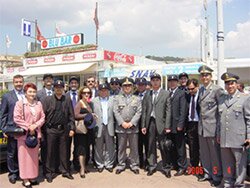 Bishkek, 11 May 2006 - The 10-day Study Tour for Judges, Prosecutors, and Heads of Anti-Drug Trafficking Department of Ministries of Interior from Kazakhstan, Kyrgyzstan, Tajikistan, and Turkmenistan was held in Rome, Italy, from 30 April to May 11, 2006. The Tour was organized under the Legal Assistance Project of the EU-UNDP Central Asia Drug Action Programme (CADAP). Bishkek, 11 May 2006 - The 10-day Study Tour for Judges, Prosecutors, and Heads of Anti-Drug Trafficking Department of Ministries of Interior from Kazakhstan, Kyrgyzstan, Tajikistan, and Turkmenistan was held in Rome, Italy, from 30 April to May 11, 2006. The Tour was organized under the Legal Assistance Project of the EU-UNDP Central Asia Drug Action Programme (CADAP).
In Rome, the group visited the Central Directorate for Anti-Drug Services under the Ministry of Interior, the National Department for Anti-Drug Policy, and the Telecommunication Operative Center (Centro Operativo Telecomuncazioni). In Naples, the delegation visited the Financial Police Office, and the Carabineer Special Operative Unit. The delegation participants expressed a genuine interest in future cooperation between corresponding agencies in Central Asia and Italy by signing the Memorandum of Cooperation directly with their Italian counterparts.
For more information, please contact Ms. Asel Sekimova (), BOMCA/CADAP Communication Specialist at + 996 (312) 61 20 18/19
EU-UNDP Border Management in Central Asia Programme: Training for High Ranking Managers
 Hungary, 31-1 June 2006 - Five high ranking experts from all Central Asian countries traveled to Hungary to learn best practices in border control and to study Integrated Border Management (IBM) methods. Participants of the Tour participated in the International Border Police Conference organized by the Hungarian Border Guards during 31 May-1 June 2006. After participation at this two-day Conference dealing exclusively with theoretical and professional issues of border management at the strategic level, a five-days tour was held to visit border crossing stations both at the European internal and external borders. The course organizers made presentations on the integrated management of border traffic, common control at border crossing points, common patrol at green borders, and the European cooperation mechanism (FRONTEX). Hungary, 31-1 June 2006 - Five high ranking experts from all Central Asian countries traveled to Hungary to learn best practices in border control and to study Integrated Border Management (IBM) methods. Participants of the Tour participated in the International Border Police Conference organized by the Hungarian Border Guards during 31 May-1 June 2006. After participation at this two-day Conference dealing exclusively with theoretical and professional issues of border management at the strategic level, a five-days tour was held to visit border crossing stations both at the European internal and external borders. The course organizers made presentations on the integrated management of border traffic, common control at border crossing points, common patrol at green borders, and the European cooperation mechanism (FRONTEX).
Note: the European Union is funding a number of projects under its Border Management and Drug Action in Central Asia (BOMCA/CADAP) programmes. The key goal of these programmes is to assist the Central Asian states to improve their security situation, and to facilitate the legal movements of persons and goods across their borders. The programmes include projects targeted at modernizing border management, preventing drug trafficking and drug abuse in the region. BOMCA/CADAP programmes are funded by the EU, whereas UNDP implements and coordinates the programmes through its country offices in all Central Asian countries.
For more information, please contact Ms. Asel Sekimova (), BOMCA/CADAP Communication Specialist at + 996(312) 61 20 18/19
UNITED NATIONS HIGH COMMISSIONER FOR REFUGEES (UNHCR)
Amendments to the Kyrgyz Law on Refugees
Bishkek, 19 May 2006 – Today amendments to the Kyrgyz Law on Refugees entered into force. Zhogorku Kenesh, the Parliament, adopted the amendments without waiting for UNHCR’s comments on the changes.
Upon implementation the enacted changes may not be in compliance with International Refugee Law, in particular with regards to two points.
First, the new “asylum seeker” definition does not include foreigners who stay in the Kyrgyz Republic illegally. If in practice this provision will deny access of such persons to refugee status determination procedures, this would be a violation of the international standards on the treatment of asylum seekers. Secondly, the recent amendments restrict the freedom of movement of asylum seekers, who are no longer allowed to choose their place of residence in the Kyrgyz Republic.
The lawmakers explained to UNHCR that this change is intended to prevent the spontaneous settlement of asylum seekers in situations of mass arrival. Again, the actual impact of the amendment will depend upon the rigidity of its implementation.
UNHCR has prepared comprehensive comments to the Kyrgyz Law on Refugees, including a comment on the new provisions, which are being shared with the relevant ministries. The Office will monitor the impact of the recent changes and will continue its work with the Government of the Kyrgyz Republic to bring national legislation closer to the international refugee protection standards.
The Centre for Refugee Women Dusti is operational
Bishkek, 10 May 2006 - Today the Centre for Refugee Women “Dusty” was inaugurated in Bishkek. It will offer its services to all women of concern to UNHCR in the Kyrgyz Republic.
“In a region where refugee rights are not always recognized and respected, it is encouraging to see that refugee women can register their own grouping and organize their activities freely,” said Carlos Zaccagnini, UNHCR’s Representative in the Kyrgyz Republic during the opening ceremony. “This centre should be open not only to refugee women, but also to former refugees, to asylum seekers, and to Kyrgyz women who may want to share their experiences.”
The centre originates in an initiative of an Afghan refugee women’s group and has now expanded its reach and activities to include legal assistance, emergency aid, vocational training workshops for small business, computer classes, income generating activities, seminars on reproductive health and family planning, as well as sexual and gender based violence. In addition, the centre will also address the needs of children by allowing them to receive supplementary education in their mother tongue and learn about the history and culture of their homeland.
“Before, we had nothing to do with refugee rights,” said a representative of UNIFEM. “Now that the centre is here, we see opportunities for new partnerships”. UNHCR hopes to see many other civil society organizations, as well as international and governmental agencies getting involved with the Centre. On May 25 an interagency meeting on future support of the Centre by UN agencies was held. UNFPA, UNAIDS, UNIFEM and UNV have already come up with very interesting concrete proposals.
For more information, please contact Ms. Sabrina Buechler, Assistant Protection Officer (UNV) UNHCR Bishkek, Kyrgyz Republic at +996 (312) 61-12-64 or by e-mail:
|

